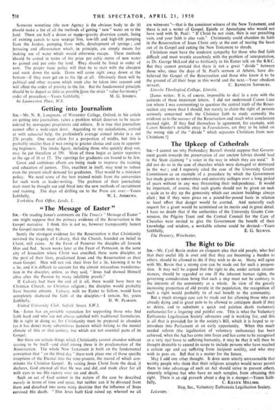SIR,—Janus has an enviable reputation for supporting those who find
faith hard and who are not always satisfied with traditional formularies. He is right in doing so, for Christianity must be prepared to abandon (as it has done) many adventitious features which belong to the mental climate of this or that century, but which are not essential parts of its Gospel.
But there are certain things which Christianity cannot abandon without ceasing to be itself—and chief among these is its proclamation of the Resurrection. The whole New Testament is built on the fundamental conviction that " on the third day " there took place one of those specific • irruptions of the Eternal into the time-process, the record of which con- stitutes the Christian Gospel. By raising Jesus Christ from the dead, it declares, God attested all that He was and did, and made clear for all with eyes to see His victory over sin and death.
Such an act of God cannot in the nature of the case be described merely in terms of time and space, but neither can it be divorced from them and dissolved into some misty doctrine that the influence of Jesus survived His death. " This Jesus bath- God raised up, whereof we all
are witnesses "—that is the consistent witness of the New Testament, and there is not a writer of Gospel, Epistle or Apocalypse who would not have said with St. Paul: " If Christ be not risen, then is our preaching vain, and your faith is also vain." Christianity could abandon its faith in the Resurrection of Jesus Christ only at the cost of tearing the heart out of its Gospel and cutting the New Testament to shreds.
Christians must have the tenderest sympathy for those who find faith difficult and must wrestle ceaselessly with the problem of interpretation, as Dr. George McLeod did so brilliantly in his Easter talk on the B.B.C. But they cannot pretend that there is not a great " divide " between those who, since the days of St. Paul's sermon at Athens, have dis- believed the Gospel of the Resurrection and those who know it to be the ground of all their hope in this world and the next.—Your obedient
servant, C. KENNETH SANSBURY. Lincoln Theologic4College, Lincoln.
[Janus writes: It is, of course, impossible to deal in a note with the contents of these important letters. I did not understand Canon Luce (on whom I was commenting) to question the central truth of the Resur- rection any more than I should, but merely to claim the right of persons seriously concerned with the Christian faith to study earnestly the evidence as to the manner of the Resurrection and reach what conclusions seemed right. If they find themselves in agreement, for example, with Canon Streeter's notable essay in Foundations, are they to be ruled on the wrong side of the " divide " which separates Christians from non- Christians ?]






































 Previous page
Previous page